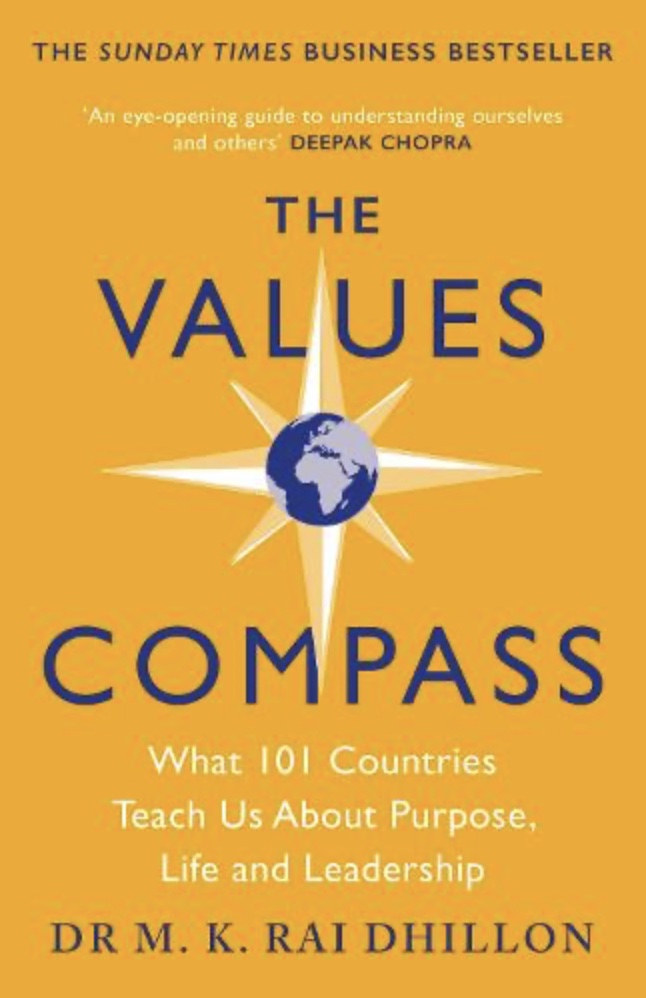“Connectivity matters for nations and economies, and the same is true for people. We all have a choice about whether to be more or less connected: to meet new people in our personal and professional worlds, to improve our understanding and empathy, and to bring together individuals and organizations who might have something in common” (p. 182).
Key Points and Concepts
Change Values
“[Change values] epitomize how nations and their people have shaped and responded to change” (p. 7).
China – Pragmatism: The Chinese “way” is to take “the clearest course of action to get a desired result and fast.” This value is apparent in current and past Chinese government policies, such as the one-child policy as well as the abolishment of presidential term limits (p. 15).
Denmark – Equality: Rooted in Danish literature, fair treatment in Denmark is a standard regardless of your sex, race, or religion. As a result, civilians are often ranked the world’s happiest and have been given the ability to truly achieve goals in society (p. 23).
Luxembourg – Adaptability: Luxembourg is recognized for its response to change while being ruled by different neighboring countries throughout history. The country welcomes immigration while also maintaining a strong national identity by enforcing its native language and culture (p. 39).
Compromise is practiced daily in the souks of Marrakesh. The markets are meant for bargaining in which “neither is intended to win the best price possible, but rather to achieve an agreement that everyone can live with” (p. 43).
Palestine – Education: The value of education is exemplified by Hanan Al Hroub, winner of the Global Teacher Prize in 2016. Her specialization in working with children traumatized with violence reinforces the importance of education (p. 56).
Singapore – Order: “We quite rightly celebrate creativity, rule-breaking, and disruption in today’s business world. But they are worth nothing if not based on a core of order” (p. 64).
United Arab Emirates – Vision: Everywhere across the nation, one can see visions that drove change- even the creation of the UAE took a vision “to unite the seven separate emirates under one national banner” (p. 81).
Continuity Values
“[Continuity values] have kept tradition and memory alive, often against great odds” (p. 8).
Armenia – Survival: Despite a history of gruesome persecution, the Armenian national identity and culture were not destroyed. Rather, it has survived and spread to descendants across the diaspora (p. 91).
Belarus – Stability: Although Belarus’ slow progress is often looked down upon, many civilians value the political and economic safety that accompanies steady change (p. 95).
Ecuador – Nature: Ecuador is a country that honors nature before everything else. This respectful mentality encourages a better way to live by creating an environment that is good for everyone (p. 104).
Germany – Introspection: “For Germany, the introspection over the past and how it should be remembered continues. This bravery in facing up to difficult history offers an important lesson because there is nothing to be gained through trying to forget what happened” (p. 112).
Uzbekistan – Etiquette: Etiquette is a defining value acquired at a young age in Uzbekistan, beginning at the dinner table. It is more than just manners but rather the foundation for a strong relationship that requires respect and empathy (p. 140).
Connection Values
Connection values shape our relationships, with friends, family, coworkers, and neighbors.
Australia – Mateship: “Mateship symbolizes everything that it means to be Australian: open-minded and welcoming to strangers, fiercely loyal to your friends, generous to those in need, and committed to the collective” (p. 151).
Brazil – Love: Love is the basis of every action in Brazil but can be seen and felt in its strongest form at Rio’s Carnival, the world’s biggest street festival. Such powerful energy and emotions at Carnival epitomize the nation’s value for love, even during unstable and threatening times.
Jordan – Helpfulness: In Jordan, helpfulness is an immediate, unquestionable reaction, no matter what the situation is. Such support has been demonstrated across the country in both small and large actions, such as the acceptance of over 650,000 Syrian refugees.
Netherlands – Directness: Although initially uncomfortable, Dutch directness is valued for its efficient and succinct approach. This style is how the government shapes policy and specifically tackled the drug problem by creating a system that focused on preventing harm rather than criminalizing behavior.
Panama – Connectivity: “Connectivity matters for nations and economies, and the same is true for people. We all have a choice about whether to be more or less connected: to meet new people in our personal and professional worlds, to improve our understanding and empathy, and to bring together individuals and organizations who might have something in common” (p. 182).
Communal Values
“[Communal values] are universally recognized in communities, companies, and countries, dictating behavior and social norms” (p. 8).
Jamaica – Discipline: Discipline can be seen in all aspects of family and cultural life, as Jamaica embraces a “society-wide responsibility to ensure discipline is upheld”. This value teaches conscious understanding and behavioral recognition at a young age” (p. 213).
Japan – Respect: Japanese culture is based on the value of respect for everyone and everything around oneself. By taking a more holistic view of the world, one can become more considerate and have the ability to understand the impact that one can make on the surrounding environment (p. 217).
Malta – Community: The small country of Malta actively displays its community spirit and togetherness to all that stay there, whether residents or visitors. Such strength through unity has improved people’s quality of life and happiness (p. 233).
Oman – Acceptance: “Change can only come when we accept ourselves, each other, and the circumstances we face together. To be accepting is to take a big step toward overcoming the divisions and hatred that undermine a peaceful society” (p. 243).
Core Values
Core values are the fundamental ideas that define our motivations and personality (p. 267).
Belgium – Modesty: Belgium has proven that putting less emphasis on material wealth and possessions and more emphasis on human interactions is a valuable societal characteristic (p. 274).
Chile – Perspective: “Crowned by the world’s clearest sky, Chile has time and again demonstrated a degree of clarity in the face of chaos. Perspective has been the key to the national progress, as it should be in all our lives” (p. 280).
England – Steadfastness: While all history and culture point back to this value, one can also simply reflect on the phrase “keep calm and carry on” (p. 295).
Iran – Commitment: “We all need things to which we can commit – beliefs, people, responsibilities. Commitment is what grounds us as people, providing anchors in our lives, and reminding us what is important” (p. 309).
Uruguay – Humility: Humility is often overlooked because it is seen as a barrier to success. By addressing humility, one can see differently and improve their appreciation of previous success (p. 336).
Living Your Values
Rai addresses the important first step of identifying your values but encourages readers to go one step further and implement them (p. 341).
One must start with their top fifteen values and reflect on which ones resonate most powerfully and speak directly to personal experiences to ultimately narrow down their top five core values.
To prioritize these values effectively, it is important to ask:
Why does this value matter to me?
• In what areas of my life is this value most relevant?
• How well do I currently live by this value? (p. 346).
A mindset on personal and focused values will allow one to be “more conscious, more confident, and more committed about the things one chooses to do” (p. 347).
Rai, M. (2020). The Values Compass: What 101 Countries Teach Us About Purpose, Life, and Leadership. Simon and Schuster.

“Ecuador – Nature: Ecuador is a country that honors nature before everything else. This respectful mentality encourages a better way to live by creating an environment that is good for everyone.”
“Jordan – Helpfulness: In Jordan, helpfulness is an immediate, unquestionable reaction, no matter what the situation is. Such support has been demonstrated across the country in both small and large actions, such as the acceptance of over 650,000 Syrian refugees.”
“To prioritize living your values effectively, it is important to ask:
Why does this value matter to me?
In what areas of my life is this value most relevant?
How well do I currently live by this value?“
